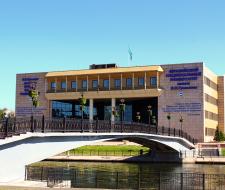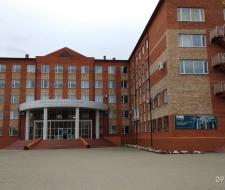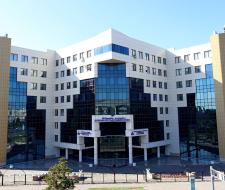6 best universities in Astana 2026
-
 from 3000.00 $ / year
from 3000.00 $ / year -

-

-

-
 from 36000.00 ₽ / 9 months
from 36000.00 ₽ / 9 months -
 from 308826.00 ₽ / year
from 308826.00 ₽ / year
Astana is a dynamically developing city, the economic, political and cultural center of young Kazakhstan, acquired city status in 1862, and since 1997 has become the capital. A recognized center of international educational tourism in the Republic of Kazakhstan: at least half of expat students study here. Local universities offer programs in Kazakh, Russian and English. At the same time, a student who has chosen the universities of the Kazakh capital as a starting point for his career will almost certainly not overpay: the price of a diploma is low here, so studying at universities in Astana is an excellent chance to get a quality education with a minimum of money.
More than half of the foreign students in Astana are natives of Uzbekistan, Tajikistan and the Russian Federation, there are also quite a lot of Chinese studying here, there are students from Pakistan, Turkey and Iran.
Alternative destinations
Advantages of Universities in Astana
When considering the benefits of studying at higher education institutions in Astana, several points stand out:
-
Affordable Education In comparison to European and even Russian universities, universities in Astana are distinguished by their low tuition fees and accessible conditions.
-
Multilingualism Universities in Astana offer programs in Russian, Kazakh, and English. Kazakhstan has been implementing a multilingual strategy for over 15 years, aiming to enhance the prestige of national education and its demand in international job markets. Universities in the country offer over a hundred programs in three languages: Kazakh, English, and Russian.
-
Cost of Living Despite the devaluation of the national currency in 2022-2023, Kazakhstan boasts affordable rental rates for real estate, as well as reasonably priced groceries and entertainment options, making Astana an excellent city for students.
-
Diverse Scholarship Programs Alongside commercial programs, universities in Astana provide numerous subsidized programs funded by state or local budgets, target grants, and scholarships. These opportunities are primarily geared towards Kazakh students but are also available to foreign students.
-
Minimal Requirements Universities in Astana have minimal requirements for prospective students. Often, admission to non-state or partially state-owned universities only requires a face-to-face or online interview and the submission of a high school diploma.
-
Opportunity for Work and Study A pleasant surprise is that in Kazakhstan, students can combine work and study without requiring additional documentation. This applies, at least, to residents of Russia, Belarus, Armenia, and Kyrgyzstan.
-
Career Opportunities Astana is home to numerous offices of multinational and relocated Russian companies, all in need of highly qualified personnel. The government also offers many job opportunities, attracting professionals from across the country.
-
Ecology When Nursultan Nazarbayev determined the location for the new capital, he made every effort to minimize negative factors, including environmental ones. Thousands of kilometers of forests have been planted in the city's surroundings, forming a kind of 'green belt' that protects residents from smog and dust.
-
Quality of Urban Infrastructure Renowned architects from around the world were involved in the city's design. As a result, Astana features modern, convenient road systems, efficient public transportation with an extensive route network and convenient schedules.
Disadvantages and Particularities of Education in Universities in Astana
-
Emphasis on Theoretical Training Unfortunately, Kazakh universities often place significant emphasis on theoretical training, with practical aspects sometimes lagging behind.
-
Lower Prestige of Diplomas Compared to European Countries Over the past 30 years since gaining independence, the Kazakh higher education system has come a long way. Currently, the level of education is comparable to that available in Eastern European universities, and some universities in Astana are approaching international rankings for young universities. However, the prestige of Kazakh diplomas may still be lower than those from European countries.
-
Lower Incomes On average, salaries in the capital of Kazakhstan range from $300 to $700, which is similar to Russian income levels. However, the cost of living, including rent and basic goods, is also relatively affordable.
Universities in Astana: What Types Exist?
According to the Committee of Statistics of the Ministry of National Economy of Kazakhstan, out of the country's 130 universities, 46 are located in Astana. These include 4 national universities, 1 international university, 1 shareholder-owned university, 1 autonomous educational institution, 11 state universities, and 3 non-civilian universities (under the jurisdiction of the Ministry of Defense, Ministry of Internal Affairs, and other government agencies). The remaining institutions are private. Authorities have implemented a consistent and stringent policy to improve the quality of education and raise qualification requirements during the licensing process.
In the 2022/2023 academic year, more than 180,000 students underwent education in Astana, including 13,000 master's students and 2,900 doctoral candidates. The proportion of international students reached 10.7%, up from just over 6% the previous year. This significant increase was driven by economic sanctions against Russia and the mass relocation of student youth.
The educational model generally adheres to the Bologna Process and consists of three levels:
- Four-year bachelor's degree programs.
- Specialized one-year master's programs and two-year scientific-pedagogical master's programs.
- Doctoral programs, including specialized and PhD programs, with a duration of at least three years.
Top 5 Universities in Astana
The capital status of Astana not only boasts an international airport with a convenient network of routes, but also some of the country's best international-level higher education institutions.
-
Nazarbayev University One of Kazakhstan's leading universities and a flagship institution of the country's first president, founded in 2010. It is located in a modern, state-of-the-art campus in the outskirts of the capital, featuring European-level infrastructure, excellent laboratories, research complexes, a stadium, a swimming pool, and superb dormitories. The university offers nearly a hundred programs at all levels in Russian, Kazakh, and English. The institution is particularly strong in engineering, technology, and social science research. Nazarbayev University is a leader in international collaboration, with over 40 agreements with top universities, providing many opportunities for studying abroad.
-
L.N. Gumilyov Eurasian National University The oldest non-state university in Astana, founded in 1992. The university offers over 90 programs at the bachelor's, master's, and doctoral levels, primarily in linguistics, law, history, and cultural studies.
-
Al-Farabi Kazakh National University One of the largest higher education institutions in Kazakhstan, located in the historic center, with a history dating back to 1934, making it one of the country's earliest universities. The university offers nearly 300 programs in various fields, with strengths traditionally lying in exact and natural sciences, technology, engineering, and economics. The university has numerous cooperation agreements with Chinese, Russian, and Turkish universities, offering diverse student mobility programs.
-
Kazakh-British Technical University Established in 2001 as an intergovernmental institution between the United Kingdom and Kazakhstan. Located in the heart of the capital, this university has a strong focus on engineering and technology. It offers undergraduate and master's programs in areas such as information and communication technologies, avionics, metallurgy, and mechanical engineering. Alongside academic training, the university excels in various research projects.
-
Kazakhstan-German University Another intergovernmental university, founded by Kazakhstan and Germany. This university offers the best bachelor's and master's programs in the country in the fields of social sciences, management, economics, business, and law. Additionally, the university boasts well-thought-out programs for increasing student mobility, allowing students to gain educational experience abroad in various fields.
Top 14 best universities in Switzerland 2026
| 1 | Glion Institute of Higher Education Switzerland |
| 2 | Les Roches International School Montana |
| 3 | César Ritz Colleges Switzerland |
| 4 | IHTTI School of Hotel Management |
| 5 | Ecole Hoteliere de Lausanne |
| 6 | Geneva Business School |
| 7 | HIM Hotel Institute Montreux |
| 8 | Swiss Hotel Management School |
| 9 | Webster University Geneva |
| 10 | Business and Hotel Management School |
| 11 | Luzern IMI |
| 12 | Swiss Hotel Management School (SHMS) Caux |
| 13 | International University in Geneva |
| 14 | Culinary Arts Academy Switzerland |
Top 10 best universities in Netherlands 2026
Top 35 best universities and colleges in Canada 2026
| 1 | University of Toronto |
| 2 | McGill University |
| 3 | University of British Columbia |
| 4 | University of Alberta |
| 5 | Simon Fraser University |
| 6 | Montreal University |
| 7 | University of Windsor |
| 8 | York University |
| 9 | University of Guelph |
| 10 | McMaster University |
| 11 | University of Manitoba |
| 12 | University of Waterloo |
| 13 | Royal Roads University |
| 14 | Vancouver Film School |
| 15 | Kwantlen Polytechnic University |
| 16 | University of Calgary |
| 17 | Dalhousie University |
| 18 | Fanshawe College |
| 19 | University of Ottawa |
| 20 | Laval University |
| 21 | Sheridan College |
| 22 | University of Regina |
| 23 | Brock University |
| 24 | Thompson Rivers University |
| 25 | Humber College |
| 26 | Vancouver Island University |
| 27 | Mohawk College |
| 28 | Centennial College Toronto |
| 29 | Niagara College |
| 30 | Capilano University |
| 31 | Seneca College |
| 32 | Algoma University |
| 33 | Saint Clair College |
| 34 | Douglas College |
| 35 | LaSalle College |
